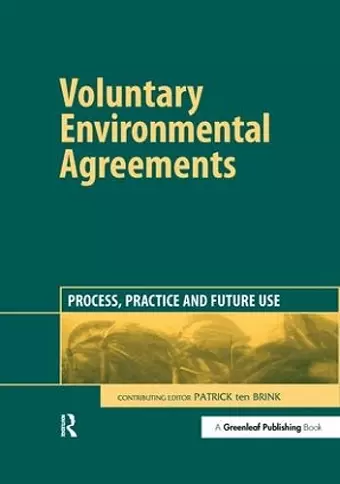Voluntary Environmental Agreements
Process, Practice and Future Use
Format:Hardback
Publisher:Taylor & Francis Ltd
Published:1st Mar '02
Currently unavailable, and unfortunately no date known when it will be back

Aims to highlight and learn the lessons from existing experience of voluntary environmental agreements, looking not just at results but also at specific elements of agreements and also at the process of the agreement itself. "Voluntary environmental agreements tend to elicit strong views ... This book is a much-needed dose of hard-headedness in a controversial field." Rob Bradley
Voluntary environmental agreements (VEAs) have been regarded as a key new instrument for meeting environmental objectives in a flexible manner. The aim of this book is to highlight and learn the lessons from existing experience.
Voluntary environmental agreements (VEAs) – generally agreements between government and business – have been regarded by many as a key new instrument for meeting environmental objectives in a flexible manner. Their performance to date has, however, also led to considerable criticism, with several parties arguing that they are methods for avoiding real action that goes beyond "business-as-usual". Is either of these positions justified?
The aim of this book is to highlight and learn the lessons from existing experience, looking not just at results but also at specific elements of agreements and also at the process of the agreement itself. Lessons are drawn from experience from across the world, covering the full range of environmental challenges, and from the perspective of key stakeholder groups. Importantly, the book also presents tools for assessing and improving existing agreements and includes recommendations and guidelines for future agreements in key areas such as climate change. It also deals at length with the problem of how such agreements might be used in developing and transitional economies.
The overall view of the book is that there is a real potential for the future use of VEAs as part of the policy mix and as a tool for sharing the responsibility for meeting environmental objectives. For the agreements to play this role, however, significant steps are needed to ensure that they are effective, efficient, equitable and appropriately linked to a portfolio of other instruments.
The book is divided into four sections. First, existing agreements, their development and efficacy are considered; second, the prospects for voluntary agreements in developing and transitional economies are discussed; third, a range of authors examine the role of VEAs as part of the policy mix to combat climate change; and, finally, the book concludes with an examination of how new tools for evaluating and improving VEAs could be utilized in the future.
Voluntary Environmental Agreements will be of interest not only to academics, governments and businesses wishing to understand this specific instrument, but also to those already implementing or considering applying VEAs to meet their environmental objectives.
Aims to highlight and learn the lessons from existing experience of voluntary environmental agreements, looking not just at results but also at specific elements of agreements and also at the process of the agreement itself. "Voluntary environmental agreements tend to elicit strong views ... This book is a much-needed dose of hard-headedness in a controversial field." Rob Bradley
ISBN: 9781874719410
Dimensions: unknown
Weight: 453g
564 pages